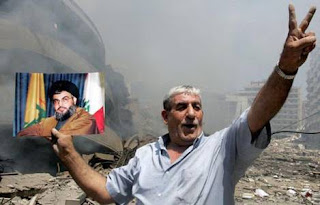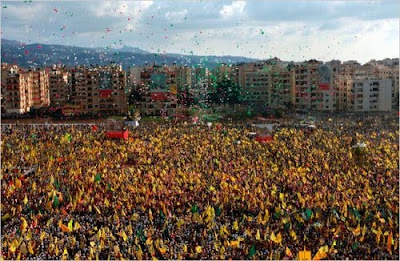الأخبار-الأربعاء 25 اب 2010
سقط ثلاثة قتلى وعدد من الجرحى في مواجهات مسلحة شهدتها أحياء في الشطر الغربي من العاصمة أمس، في استعادة لأجواء التوتر المسلح، الذي يرافق التوتر السياسي القائم في البلاد
هكذا، فجأة، ومن دون مقدمات، يقع إشكال، تطلق النيران بكثافة، يسقط ضحايا بين قتلى وجرحى. تتوتر الأحياء الداخلية في بيروت. يلجأ الناس الى منازلهم، وينتشر مسلحون في الأزقة، بينما تقوم وحدات من الجيش بالانتشار البطيء، قبل أن يخرج اجتماع ثلاثي بين الجيش وحزب الله وجمعية المشاريع الخيرية (الأحباش) بخطوات لإخلاء الشوارع ونشر وحدات الجيش في كل الأمكنة، والعمل على تهدئة إعلامية. لكن إشكالاً يستمر قرب أحد المقارّ التابعة للأحباش...
ببراءة، يمكن الحديث عن إشكال فردي له ما سبقه من توترات بين أفراد على أمور تافهة، لكن المناخات العامة، وتفاصيل الإشكال الدموي، ترسم علامات استفهام حول ما حصل، وتجعل الأعين مفتوحة بقوة على ما يعدّ لهذا البلد من فتن لا تبقي شيئاً.
ميدانياً، سقط ثلاثة قتلى وأصيب نحو عشرة آخرين بجروح مختلفة، فيما أحرقت سيارات ومبان ومقارّ. أما سياسياً، فقد كانت المفاجأة الكبرى، اندلاع المواجهة بين حليفين قريبين من التوجهات السياسية ذاتها، وتربطهما علاقة خاصة بسوريا، وخصومة واحدة ضد تيار «المستقبل» وتعرّضا معاً للحملة ذاتها إثر الانقلاب الكبير عقب اغتيال الرئيس رفيق الحريري.
التوتر الذي استمر مسيطراً على الأحياء المحيطة بمنطقة الاشتباكات، ترافق مع قلق عكسته اتصالات الأهالي في المنطقة ولجوء بعضهم الى ترك المنازل باتجاه مناطق أكثر أمناً، بينما ظل مسلحون يجلسون في مداخل بعض الأبنية، وسط انتشار الجيش العسكري والأمني.
ميدانياً، وقبل وقت قليل من موعد الإفطار، حصل إشكال مساء أمس، بين شبّان من حزب الله وآخرين من جمعيّة المشاريع الخيريّة الإسلاميّة (الأحباش) على خلفيّة ركن سيّارة قرب المركز الرئيسي لجمعيّة المشاريع، بعدما كان إشكال مشابه قد وقع قبل يومين بين الطرفين تحوّل إلى عراك بالأيدي. وعندما وصل مسؤولون من حزب الله إلى مكان الحادث لمحاولة حله، حصل إطلاق نار أدّى إلى مقتل أحد مسؤولي حزب الله في منطقة برج أبي حيدر محمد فواز وجرح شاب معه.
وتطوّر الإشكال بسرعة إلى تبادل لإطلاق النار بالأسلحة الرشاشة وقذائف «الأر.بي.جي»، والقنابل اليدويّة. وانتشر المسلّحون في محيط المنطقة من البسطة إلى رأس النبع وبربور ومار الياس. كذلك انتشرت سيّارات الإسعاف عند مفارق الطرق التي أقفلها المسلّحون. واستمرّت الاشتباكات نحو أربع ساعات على نحو متقطّع، إذ كانت زخّات الرصاص تُسمع على نحو غير متواصل، وذلك في ظلّ استنفار واحتقان عند المسلّحين المنتشرين في الشارع.
وقد صدر ليلاً بيان مشترك من قيادتي حزب الله وجمعية المشاريع الخيرية الإسلامية جاء فيه: «على أثر الحادث الفردي المؤسف الذي وقع عصر الثلاثاء (أمس) بين شباب من حزب الله وجمعية المشاريع الخيرية الإسلامية، تداعت قيادتا الطرفين إلى اجتماع عاجل في فرع استخبارات بيروت، وجرى التأكيد أن الحادث المؤسف هو فردي ولا خلفيّات سياسيّة أو مذهبيّة وراءه، وقد اتفق على محاصرته وإنهائه فوراً ومنع أي ظهور مسلّح بغية عودة المياه إلى مجاريها الطبيعية كما كانت، ومعالجة كل التداعيات الناجمة عنه».
وأضاف بيان الطرفين أنه تقرّر فتح تحقيق عاجل تجريه قيادة الجيش اللبناني ورفع الغطاء عن كل من «يحاول المسّ بمسيرة الأمن والاستقرار الذي هو أولويّة لدى الطرفين وكل الأطراف الوطنية، وجرى الاتفاق على إبقاء الاجتماعات مفتوحة لتفويت الفرصة على كل المصطادين في الماء العكر».
****************
السفيرالخميس 26 اب 2010
إيران تعلن عن الاستعداد لتسليح الجيش اللبناني بما يريد «إذا طلب»
بيروت تستعيد هدوءها: جمر الأسئلة تحت الرماد مجلس الوزراء يطلب تخفيف الاحتقان ... وحزب الله يرى أن الحادث كشف «بروفات»
لملمت منطقة برج أبي حيدر أمس جراحها، فيما بقيت الأسئلة التي أثارتها الاشتباكات بين حزب الله وجمعية المشاريع الخيرية الإسلامية من دون أجوبة واضحة، في انتظار انتهاء التحقيق، ما ترك الباب مفتوحا أمام استنتاجات عدة.
وإذا كانت شرارة الإشكال فردية، إلا أن تطوره السريع بشكل دراماتيكي عزّز الاعتقاد باحتمال دخول مندسّين على الخط، عمدوا إلى صب الزيت على النار، وهو أمر لا يبرر بطبيعة الحال ما جرى، بل كان أولى به أن يدفع الطرفين المعنيين إلى مزيد من الوعي والتنبه إلى مخاطر الاختراق، وهما اللذان يدركان حساسية المرحلة، وخصوصا أن خطابهما السياسي يواظب على التحذير من الفتنة.
ولأن حزب الله هو القوة الأكثر تنظيما، ولأنه الحزب الأكثر عرضة للاستهداف السياسي والأمني نتيجة التزامه بخيار المقاومة، فقد بدا هو المعني، في الدرجة الأولى، بعدم الانجرار الى مستنقع صراع الزواريب الذي اختبرته قوى أخرى في السابق وخرجت منه منهكة.
وليس صعبا الاستنتاج أن حزب الله هو المتضرر الأكبر مما حصل، كما بيّنت التداعيات السباسية لمعركة برج أبي حيدر، علما أن أوساطه تؤكد أنه كان الطرف المعتدى عليه وأن خسارته لمسؤول بارز فيه كانت موجعة، وأنه خلافاً لكل ما يقال فهو أظهر قدراً عالياً من ضبط النفس، حال دون أن تأخذ الأمور أبعادا أخطر.
ولأن حزب الله هو القوة الأكثر تنظيما، ولأنه الحزب الأكثر عرضة للاستهداف السياسي والأمني نتيجة التزامه بخيار المقاومة، فقد بدا هو المعني، في الدرجة الأولى، بعدم الانجرار الى مستنقع صراع الزواريب الذي اختبرته قوى أخرى في السابق وخرجت منه منهكة.
وليس صعبا الاستنتاج أن حزب الله هو المتضرر الأكبر مما حصل، كما بيّنت التداعيات السباسية لمعركة برج أبي حيدر، علما أن أوساطه تؤكد أنه كان الطرف المعتدى عليه وأن خسارته لمسؤول بارز فيه كانت موجعة، وأنه خلافاً لكل ما يقال فهو أظهر قدراً عالياً من ضبط النفس، حال دون أن تأخذ الأمور أبعادا أخطر.
وقالت أوساط الحزب لـ«السفير» إنه يجب الالتفات إلى أن من قتل في اللحظات الأولى هو المسؤول الميداني الذي يتولى عادة في حالات التوتر لجم الانفعالات وضبط الشارع، وبالتالي فإن العناصر التي تعمل تحت إمرته صدمت بمقتله المفاجئ وبفقدان مرجعيتها المباشرة، فلجأت إلى رد فعل تلقائي احتاجت السيطرة عليه إلى بعض الوقت.
تسليح الجيش... والاستعداد الإيراني
الى ذلك، تطرق الوزير الحاج حسن في مداخلته إلى مسألة تسليح الجيش، وقال إن «الرئيس ميشال سليمان طرح بعد مواجهة العديسة ضرورة تسليح الجيش، وأمس (الأول) أثار الأمين العام لحزب الله هذا الموضوع، وأنا أقترح بما ومن أمثل تشكيل لجنة وزارية تجول على الدول العربية الممتلئة مخازنها بالأسلحة لطلب الحصول على كميات منها، على أن تزور اللجنة أيضا إيران ونحن جاهزون أن نوظف صداقتنا مع إيران لتسهيل الحصول على سلاح منها»، معتبرا أن «حقنا على أصدقائنا وأشقائنا مساعدتنا في تسليح الجيش».
وبينما تجنب مجلس الوزراء اتخاذ موقف من اقتراح حزب الله، أعلن وزير الدفاع الإيراني العميد أحمد وحيدي عن استعداد إيران التام لتسليح الجيش اللبناني بما يريد في حال تسلمت طلبا منه بذلك. ونسبت وكالة «أنباء فارس» إلى العميد وحيدي قــــوله إن بلاده على استعداد تام لتجهيز الجيش اللبناني، مشيرا إلى أن «لبنان يعتبر من الدول الصديقة للشعب الإيراني».



























